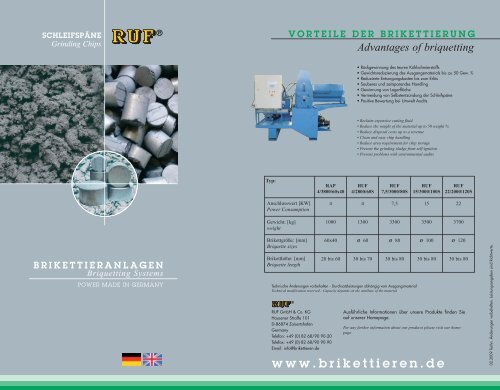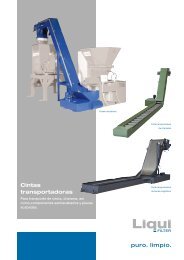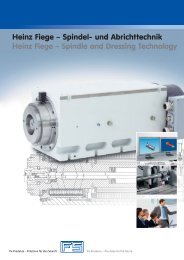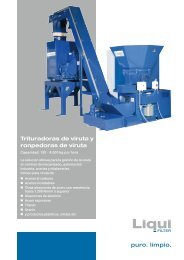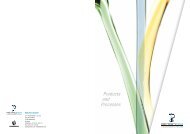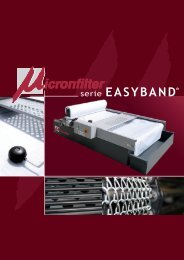Grinding Chips - Ehaff
Grinding Chips - Ehaff
Grinding Chips - Ehaff
Sie wollen auch ein ePaper? Erhöhen Sie die Reichweite Ihrer Titel.
YUMPU macht aus Druck-PDFs automatisch weboptimierte ePaper, die Google liebt.
Schleifspäne<br />
<strong>Grinding</strong> <strong>Chips</strong><br />
Vorteile der brikettierung<br />
Advantages of briquetting<br />
• Rückgewinnung des teuren Kühlschmierstoffs<br />
• Gewichtsreduzierung des Ausgangsmaterials bis zu 50 Gew. %<br />
• Reduzierte Entsorgungskosten bis zum Erlös<br />
• Sauberes und zeitsparendes Handling<br />
• Gewinnung von Lagerfläche<br />
• Vermeidung von Selbstentzündung der Schleifspäne<br />
• Positive Bewertung bei Umwelt Audits<br />
• Reclaim expensive cutting fluid<br />
• Reduce the weight of the material up to 50 weight %<br />
• Reduce disposal costs up to a revenue<br />
• Clean and easy chip handling<br />
• Reduce area requirement for chip storage<br />
• Prevent the grinding sludge from self-ignition<br />
• Prevent problems with environmental audits<br />
Typ:<br />
RAP<br />
4/3800/60x40<br />
RUF<br />
4/2800/60S<br />
RUF<br />
7,5/3000/80S<br />
RUF<br />
15/3000/100S<br />
RUF<br />
22/2000/120S<br />
Anschlusswert [KW]<br />
Power Consumption<br />
4<br />
4<br />
7,5<br />
15<br />
22<br />
Gewicht: [kg]<br />
weight<br />
1000<br />
1300<br />
3300<br />
3500<br />
3700<br />
Brikettieranlagen<br />
Briquetting Systems<br />
Power MADE IN GERMANY<br />
Brikettgröße: [mm]<br />
Briquette sizes<br />
Briketthöhe: [mm]<br />
Briquette length<br />
60x40<br />
20 bis 60<br />
Technische Änderungen vorbehalten - Durchsatzleistungen abhängig vom Ausgangsmaterial<br />
Technical modification reserved - Capacity depends on the attribute of the material<br />
RUF GmbH & Co. KG<br />
Hausener Straße 101<br />
D-86874 Zaisertshofen<br />
Germany<br />
Telefon: +49 (0) 82 68/90 90-20<br />
Telefax: +49 (0) 82 68/90 90-90<br />
Email: info@brikettieren.de<br />
ø 60<br />
30 bis 70<br />
ø 80<br />
30 bis 80<br />
ø 100<br />
30 bis 80<br />
Ausführliche Informationen über unsere Produkte finden Sie<br />
auf unserer Homepage.<br />
For any further information about our products please visit our homepage.<br />
www.brikettieren.de<br />
ø 120<br />
30 bis 80<br />
02.2009 Techn. Änderungen vorbehalten. Leistungsangaben sind Richtwerte.
Vom Reststoff zum Wertstoff<br />
From waste materials to raw materials<br />
SchleifSpäne<br />
<strong>Grinding</strong> chips<br />
Metallische Schleifspäne sind in<br />
Ihrer Zusammensetzung so vielfältig<br />
wie kein anderer Reststoff<br />
in der industriellen Produktion.<br />
Sie setzen sich aus dem metallischen<br />
Abrieb des Werkstücks,<br />
dem Kühlschmierstoff (KSS: Öl<br />
oder Emulsion) und dem Abrieb<br />
der Schleifmittel zusammen. Die<br />
Anteile an metallischem Abrieb,<br />
KSS und Schleifmittel können je<br />
nach bearbeitetem Metall,<br />
Schleif verfahren und Schleifmittel,<br />
sehr stark variieren.<br />
Insbesondere der Austrag hochwertiger<br />
Kühlschmierstoffe (KSS)<br />
stellt in der Regel einen wesentlichen<br />
Kostenfaktor dar, welcher<br />
den Einsatz effizienter Recyclingtechniken,<br />
wie das Brikettieren,<br />
ökonomisch und ökologisch sinnvoll<br />
macht.<br />
Bis auf wenige Ausnahmen lassen<br />
sich Schleifspäne brikettieren.<br />
Dieses Verfahren gewährleistet<br />
eine sehr hohe Rückgewinnung<br />
und Wiederverwertung (bis 50<br />
Gew. %) der wertvollen Schleiföle<br />
oder Emulsionen, sowie eine Verringerung<br />
der Entsorgungskosten.<br />
Teilweise lassen sich Erlöse für die<br />
Briketts erzielen.<br />
Die Amortisationszeit der Brikettpressen<br />
liegt oft unter einem Jahr.<br />
Da der KSS während des Pressverfahrens<br />
keiner thermischen<br />
Belastung ausgesetzt ist, kann er<br />
ohne additive Aufbereitung direkt<br />
in den Filterkreislauf der Produktion<br />
zurückgeführt werden.<br />
Der Schleifspan wird hoch verdichtet,<br />
wodurch bei der innerbetrieblichen<br />
Logistik wie auch beim<br />
Transport der Briketts Kapazitäten<br />
eingespart werden.<br />
Wir verfügen über langjährige<br />
Kontakte zu den entsprechenden<br />
Verwertern und sind Ihnen gerne<br />
bei der Vermarktung der Briketts<br />
behilflich.<br />
Beschreibung der Anlage:<br />
Unsere Brikettieranlagen unterscheiden<br />
sich nach Anschlussleistung<br />
und Brikettgröße. Wir fertigen<br />
Anlagen von 4 bis 22 KW<br />
mit Stundendurchsätzen von<br />
40 bis 400 kg/h Material - Eingangsmenge.<br />
Alle RUF Brikettieranlagen werden<br />
hydraulisch betrieben und<br />
sind nach einem Baukastenprinzip<br />
kompakt aufgebaut. Sie eignen<br />
sich für einen mannlosen<br />
24-Stunden-Betrieb und können<br />
als zentrale- oder dezentrale<br />
Anlage eingesetzt werden. Die<br />
komplette Anlage ist auf einer<br />
Auffangwanne mit Schrägboden<br />
aufgebaut. Die Aufgabe des zu<br />
verpressenden Materials kann<br />
kontinuierlich oder diskontinuierlich<br />
erfolgen. Ein Rührwerk im<br />
Materialtrichter beugt Brückenbildung<br />
vor. Über eine Schnecke<br />
werden die Schleifspäne der<br />
Presskammer zugeführt. Der<br />
Presskolben verdichtet das Material<br />
nach den in der SPS eingestellten<br />
Parameter zu einem Brikett.<br />
Das ausge presste Kühlschmiermittel<br />
sammelt sich im<br />
Pumpensumpf und wird niveauabhängig<br />
über eine Pumpe<br />
abgefördert.<br />
In its consistency metallic grinding<br />
sludge is the most variable of<br />
all industrial residues. <strong>Grinding</strong><br />
sludge consists of the metallic<br />
particles from the work piece, the<br />
coolant / lubricant (oil or emulsion)<br />
and the abrasive particles<br />
from the grinding tool. The proportion<br />
and size of metallic particles,<br />
the coolant / lubricant and<br />
proportion of grinding wheel<br />
varies dramatically, depedending<br />
on the process.<br />
The recovery of high quality<br />
coolant / lubricant in particular,<br />
gives a considerable cost saving<br />
which makes the use of an efficient<br />
recycling technology economically<br />
and ecologically viable.<br />
With very few exeptions, almost all<br />
grinding sludges are briquettable.<br />
With our technology it is possible<br />
to reclaim the maximum volume of<br />
valuable grinding oils and emulsions<br />
(up to 50 weight %) and to<br />
reduce the disposal costs. In some<br />
cases, it is possible to generate a<br />
revenue from the briquettes, too.<br />
Many of our clients see a pay back<br />
on their capital investments in less<br />
than 12 months.<br />
As the grinding oil or emulsion is<br />
not subject to any thermal stress<br />
during the briquetting process, it<br />
is not degraded. Therefore it can<br />
be returned to the production process<br />
without additional treatment.<br />
The grinding chips are highly<br />
compacted, which reduces storage<br />
and haulage costs.<br />
We have long standing contacts<br />
with recycling companies and are<br />
always ready to support you in the<br />
marketing of the briquettes.<br />
Description of the press :<br />
Our range of machines varies in<br />
both briquette size and power consumption<br />
to cover most applications.<br />
We manufacture briquetting<br />
plants as from 4 kW to 22 kW with<br />
hourly capacities of 40 to 400 kg<br />
of incoming material. All RUF<br />
briquetting presses are hydraulically<br />
powered and manufactured<br />
in a proven and compact modular<br />
system<br />
All models are designed for automatic<br />
24 hour operation and can<br />
be used as a centralised processing<br />
plant or as a local unit. The<br />
complete machine is mounted on<br />
an oil collection sump with a slanting<br />
bottom and self cleaning feature.<br />
The feeding of the briquetting<br />
materials can be continuous or in<br />
batches.The agitator in the material<br />
hopper prevents bridging. A<br />
feeding screw charges the metal<br />
chips into the press chamber. The<br />
press piston compacts the chips to<br />
a briquette, in accordance with<br />
the parameters set in the PLC.<br />
These can be easily adjusted for<br />
different sludge types. The extruded<br />
coolant / lubrication is collected<br />
in the sump and discharged by<br />
a pump.


